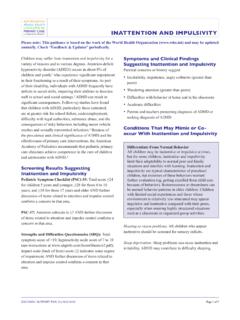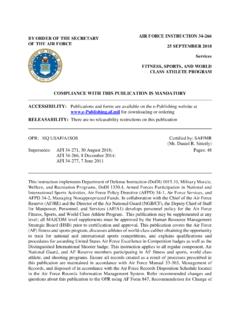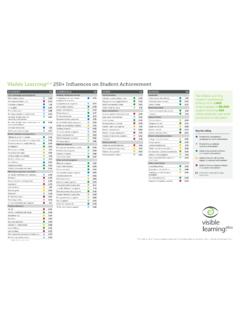Transcription of Mindfulness-based Mind Fitness Training: A Case Study of a ...
1 Available online at Cognitive and Behavioral Practice 18 (2011) 566 576. Mindfulness-based mind Fitness training : A Case Study of a High-Stress Predeployment military Cohort Elizabeth A. Stanley, Georgetown University and The mind Fitness training Institute John M. Schaldach, The mind Fitness training Institute Anastasia Kiyonaga and Amishi P. Jha, University of Pennsylvania Current military deployments have resulted in many psychological and physical health issues and created interest in protective measures to mitigate effects of prolonged and repetitive stress. mindfulness training has been successfully used for stress reduction in other contexts.
2 The following case report presents a detachment of Marines who received Mindfulness-based mind Fitness training (MMFT) prior to deployment. Self-report measures of mindfulness , perceptions of stress, predictors of compliance with mindfulness practice, and time spent engaging in practice were indexed. More time spent engaging in practice corresponded with greater self-reported mindfulness ; increases in mindfulness were associated with decreases in perceived stress. T HE demands of multiple deployments have resulted in a broad range of psychological and physical health challenges related to prolonged exposure to stressful as Mindfulness-based mind Fitness training (MMFT), as they prepared to deploy to Iraq.
3 Environments in military service-members (Mental The Deleterious Effects of Stress for the military Health Advisory Team [MHAT], 2008). While the stressors of military deployment are widely recognized (Adler, military service is an inherently stressful profession. McGurk, Stetz, & Bliese, 2003; King, King, Vogt, Knight, & Service-members are expected to deal with significant and Samper, 2006), comparatively less is known about potentially traumatizing stressors before, during, and effective methods for buffering against stress-related after deployment, including threats to individual safety, dysfunction and disease.
4 The suffering of veterans of the need to inflict harm on others, and exposure to injury, recent deployments, compromised effectiveness of the death, and significant human suffering (Adler et al., fighting force, and high costs of caring for combat 2003). Ample evidence suggests that troops may experi- veterans with stress-related ailments have motivated the ence considerable anxiety and distress in anticipation of military to investigate training programs to bolster deployment (Bolton, Litz, Britt, Adler, & Roemer, 2001;. psychological resilience as a prophylaxis against deploy- MacDonald, Chamberlain, Long, Pereira-Laird, & Mirfin, ment stressors.)
5 1998), which may place them at higher risk for mental mindfulness training (MT) has emerged as an effica- health problems after deployment (Maguen et al., 2008). cious approach for reducing stress in a variety of civilian Deployment presents additional stressors, such as difficult contexts (Grossman, Niemann, Schmidt, & Walach, 2004) living conditions, boredom, and family separation; recent and as a useful component in treating clinical populations research demonstrates a strong association between (Baer, 2006). MT protocols aim to bolster mindfulness mental health disorders and such lower-magnitude a mental mode characterized by full attention to present- deployment stressors (King et al.
6 , 2006). Multiple deploy- moment experience without judgment, elaboration, or ments exact a high toll, including lower morale, more emotional reactivity. This case report presents a cohort mental health problems, and more stress-related work of Marine reservists who received a novel MT problems (MHAT, 2008). In addition, combat exposure intervention tailored for the military context, referred to has been linked to a range of negative health conse- quences, including posttraumatic stress disorder (PTSD;. Kaylor, King, & King, 1987), depression (Erickson, Wolfe, 1077-7229/11/566 576$ King, King, & Sharkansky, 2001), substance abuse 2011 Association for Behavioral and Cognitive Therapies.
7 (Boscarino, 1981), and physical health problems (Taft, Published by Elsevier Ltd. All rights reserved. Stern, King, & King, 1999). Predeployment mindfulness training 567. Service-members returning from recent deployments There is now considerable evidence of the effective- report a broad range of concerns. Physiological con- ness of Mindfulness-based interventions at reducing cerns include disturbed sleep habits, low energy, head- distress (Baer, 2003; Grossman et al., 2004). The most aches, chronic pain, cardiopulmonary symptoms, and common and well-validated MT program is mindfulness - gastrointestinal difficulties (Levin, 2007; Scaer, 2008).
8 based stress reduction (MBSR; Kabat-Zinn, 1990). In Psychological concerns include PTSD, traumatic brain addition, MT has been incorporated as a component in injury, depression, and anxiety disorders (Milliken, clinical interventions for a range of disorders, including Auchterlonie, & Hoge, 2007; Tanielian & Jaycox, borderline personality disorder (Linehan, 1993), sub- 2008). Complicating matters, PTSD is frequently comor- stance abuse (Witkiewitz, Marlatt, & Walker, 2005), bid with other psychological problems (Tanielian & recurrent depression (Segal, Williams, & Teasdale, Jaycox) and is also linked to physical problems (Hoge, 2002), eating disorders (Kristeller, Baer, & Quillian- Terhakopian, Castro, Messer, & Engel, 2007).)
9 These Wolever, 2006), generalized anxiety disorder (Roemer myriad dysfunctions are frequently labeled as indepen- & Orsillo, 2002), and posttraumatic stress (Wolfsdorf &. dent issues and treated separately, but an emerging Zlotnick, 2001). Prior clinical studies have also suggested alternative perspective conceives of these disparate that MT may help provide psychological prophylaxis . disorders as a spectrum of responses to prolonged or (Teasdale et al., 2000). Recently, studies report that MT. extreme stress rather than as illnesses with unrelated can increase mindfulness and that increases in mindful- causes (Herman, 1992; Scaer, 2005; van der Kolk, Roth, ness mediate decreases in perceived stress and increases Pelcovitz, Sunday, & Spinazzola, 2005).
10 In well-being (Carmody & Baer, 2008; Shapiro, Oman, Yet, trauma research suggests that pathology is actually Thoresen, Plante, & Flinders, 2008). Importantly, these the exception rather than the normal response to studies emphasize that beyond simply having received overwhelming experience; most people display resilience MT, a critical factor in determining if salutary effects are despite adversity (Bonanno, 2008; van der Kolk, 2002). observed is the amount of time spent engaging in Resilience is conceived of as an individual's ability to move mindfulness practice. through significant or chronic stress and display adaptive psychobiological allostasis (Feder, Nestler, & Charney, Promoting Stress Resilience in military Cohorts 2009; Haglund, Nestadt, Cooper, Southwick, & Charney, With mindfulness training 2007).










